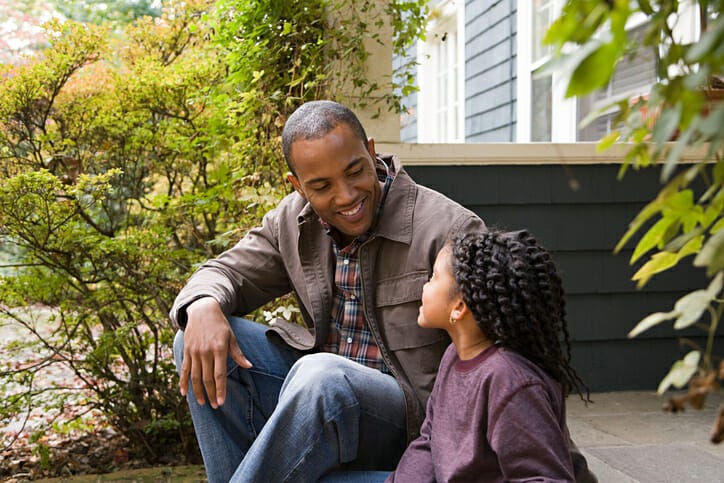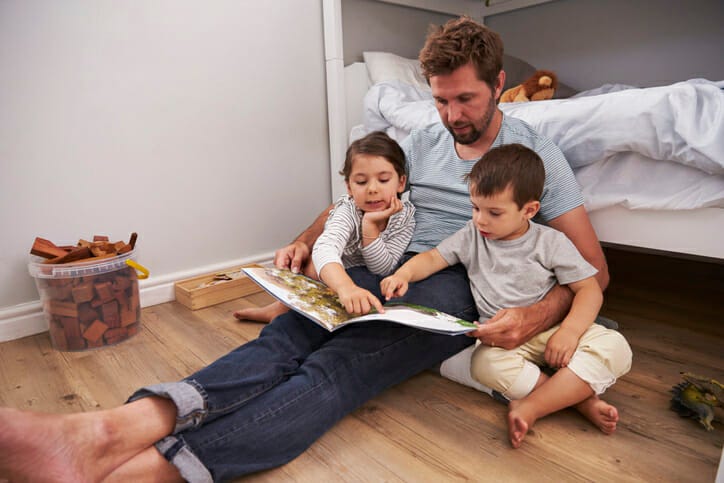Parenting Goals Part 2: Parents With Toddlers

We've talked about setting parenting goals as a new parent. Today, we want to talk to those of you who have toddlers. It can be a very hard stage of life for both you and your toddler. Your child is developing his personality and becoming more independent. You’re learning how to parent and love through all of his toddler tantrums and developmental milestones.
Want to know one way you can be a more effective parent and have a better parent-child relationship? You can set parenting goals for yourself, as well as set parent-child goals together with your toddler.
1. Turn the Daily Chaos Into Organization and Calm.
One minute you’re making breakfast. The next minute you’re yelling at one kid to get off the iPad, yelling at another kid to brush their teeth, making lunches and then realizing you burned breakfast while loading the stroller into the car. Sound familiar? Morning chaos can easily happen with kids, but chaos doesn’t have to be a part of each day. Have a family calendar with everyone’s schedules on it (and put it where everyone can see it), go over the day’s schedule the night before, set up simple morning and nighttime routines, have a help chart and do whatever else needed to turn your home’s chaos into organization and calm.
2. Remember to Reconnect Throughout the Day.
 Constant connection with our children isn’t possible. They have school, soccer, dance, band, etc., and you have work, church activities, community responsibilities, etc. Separation is going to happen, which means you have to regularly reconnect with each other. And remember this is focused on quality time. So resolve to hug your child and tell them you love them before one of you leaves the house. Resolve to spend more than five minutes talking with them about their day before bed. Resolve to find different times throughout the day to reconnect with and focus on your child.
Constant connection with our children isn’t possible. They have school, soccer, dance, band, etc., and you have work, church activities, community responsibilities, etc. Separation is going to happen, which means you have to regularly reconnect with each other. And remember this is focused on quality time. So resolve to hug your child and tell them you love them before one of you leaves the house. Resolve to spend more than five minutes talking with them about their day before bed. Resolve to find different times throughout the day to reconnect with and focus on your child.
3. Have One-on-One Chats.
You’ve heard of family meetings or family councils, right? This is where parents and kids get together to give everyone a chance to be heard on certain family matters and respectfully brainstorm solutions to fix issues. I think family councils are great. But sometimes I think one-on-one conversations or two-on-one (both parents with one child) are just as important. Some kids are more open when they’re not around their siblings. And while I haven’t raised teenagers yet, I was one, and I appreciated when my parents took the time to sit and talk with me about things one-on-one.

4. Try New Things Together.
Create a new memory by trying something new together. Take a painting or cooking class. Learn a new language. Go surfing or skydiving. You could even start and share a hobby together, like playing tennis, pencil drawing or gardening. Whatever you do, make it an experience to remember. And don’t let having a baby stop you. Just grab your baby carrier and start taking hikes or visiting museum exhibits together. A child is never too young to get out and adventure or get a little culture.
5. Start a New Tradition Together.
Along those same lines, you and your child could start a new tradition together, like going to a concert once a year, cooking Saturday morning breakfast together, taking them to their favorite restaurant on the last day of school or having monthly parent-child outings.
6. Be Each Other’s Cheerleader.
 Who doesn’t want a personal cheerleader? We all could use one. You can promise to be there to help your child face their fears, support them through tough learning experiences and be the crazily excited parent when they win 1st place at the science fair. And in turn, your child can be there to challenge you to try new things, get you ice cream when something goes wrong and tell you that you’re awesome after you get a work promotion.
Who doesn’t want a personal cheerleader? We all could use one. You can promise to be there to help your child face their fears, support them through tough learning experiences and be the crazily excited parent when they win 1st place at the science fair. And in turn, your child can be there to challenge you to try new things, get you ice cream when something goes wrong and tell you that you’re awesome after you get a work promotion.
7. Take Intended Time Away From Technology.
I’m probably just as tired of hearing “put down your devices” as you are, but I think most of us still need to be reminded of this. The best way to connect is to disconnect. So when you’re together, be it driving in the school drop-off line or at dinner, make sure you’re both present. If you need help, get a basket to keep your devices in or get an app that will help you stop using some apps and kick your smartphone addiction.

8. Read More.
While you’ve got your phones down, pick up a book. Children receive lasting benefits when you read to them. It will help build their vocabulary and imagination while also building your parent-child relationship. If your child is still young enough, or willing, read a short book or chapter in a book before bed. And if you have teenagers, model the importance of reading by letting your child see you read more than scrolling through Instagram or Facebook. You could also make going to your public library a regular thing, and then hang some floating shelves in a kids’ space and regularly rotate books so you and your kids always have something new to read together.
9. Stop the Sarcasm.
Sarcasm is just disguising your anger in a humorous way. Except, it’s not funny and not good for your relationship. It’s OK for kids and parents to be upset, but communicating your feelings in a sarcastic way isn’t. So, especially if you have teenagers, resolve to work on cutting out the sarcasm and communicating your feelings more honestly and openly.

 Constant connection with our children isn’t possible. They have school, soccer, dance, band, etc., and you have work, church activities, community responsibilities, etc. Separation is going to happen, which means you have to regularly reconnect with each other. And remember this is focused on quality time. So resolve to hug your child and tell them you love them before one of you leaves the house. Resolve to spend more than five minutes talking with them about their day before bed. Resolve to find different times throughout the day to reconnect with and focus on your child.
Constant connection with our children isn’t possible. They have school, soccer, dance, band, etc., and you have work, church activities, community responsibilities, etc. Separation is going to happen, which means you have to regularly reconnect with each other. And remember this is focused on quality time. So resolve to hug your child and tell them you love them before one of you leaves the house. Resolve to spend more than five minutes talking with them about their day before bed. Resolve to find different times throughout the day to reconnect with and focus on your child.

 Who doesn’t want a personal cheerleader? We all could use one. You can promise to be there to help your child face their fears, support them through tough learning experiences and be the crazily excited parent when they win 1st place at the science fair. And in turn, your child can be there to challenge you to try new things, get you ice cream when something goes wrong and tell you that you’re awesome after you get a work promotion.
Who doesn’t want a personal cheerleader? We all could use one. You can promise to be there to help your child face their fears, support them through tough learning experiences and be the crazily excited parent when they win 1st place at the science fair. And in turn, your child can be there to challenge you to try new things, get you ice cream when something goes wrong and tell you that you’re awesome after you get a work promotion.
























